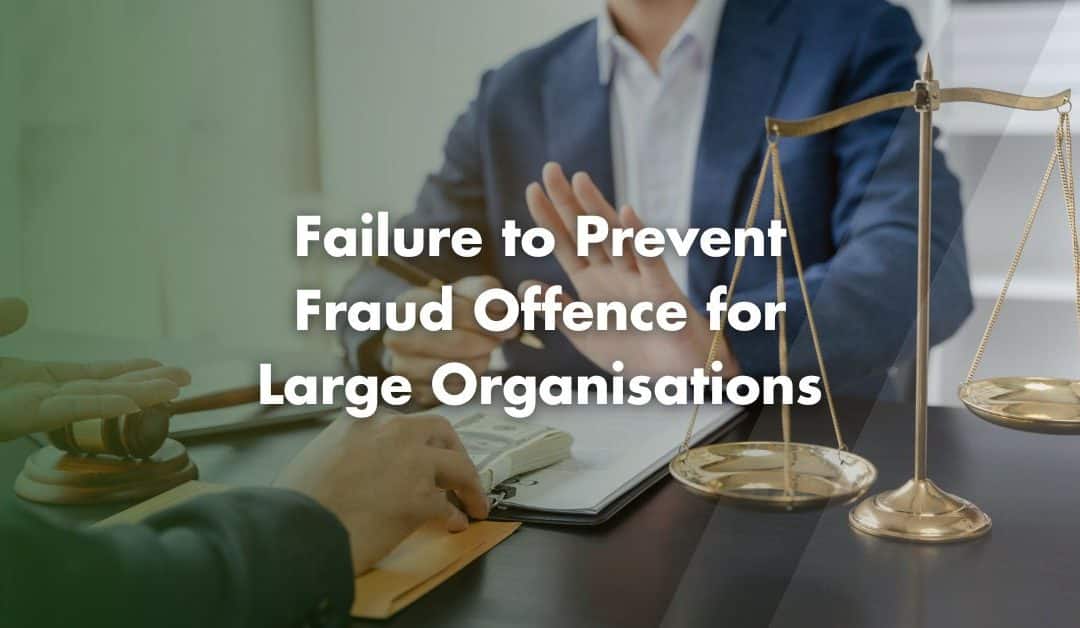The “Failure to Prevent Fraud” offense means a large organisation can be held criminally liable if it benefits from fraud committed by an employee, agent or another associate acting on its behalf. This offence applies even if the organisation did not directly commit the fraud.
Introduced with the Economic Crime and Corporate Transparency Act, the Failure to Prevent Fraud offence will begin to take effect from 1st September 2025.
Fraud can include activities like:
- Dishonest sales practices
- Hiding crucial information from customers or investors
- False accounting or fraudulent trading
If prosecuted, organisation face Unlimited Fines unless they can prove they had reasonable measures in place to prevent fraud.
Who the Failure to Prevent Fraud Offence Applies To
The Failure to Prevent Fraud offence applies to large organisations meeting two out of three of these criteria:
- More than 250 employees
- More than £36 million turnover
- More than £18 million in total assets
The definition includes subsidiaries and applies regardless of where the organisation operates or is headquartered. It is not limited to business alone. Charities, partnerships and other entities incorporated by statute or Royal Charter could also fall under the law if they meet the criteria.
Reason for the Introduction of Failure to Prevent Fraud
Fraud is a growing issue, accounting for 40% of all crime in England and Wales. This law is designed to encourage organisations to take fraud prevention seriously, mirroring the approach taken with the Bribery Act 2010.
By holding companies accountable, the law pushes them to implement proper fraud prevention strategies. It aims to reduce fraud and also protect businesses, investors and the public.
Reasonable Procedure Defence
Organisations can defend themselves against the Failure to Prevent Fraud offence if they can prove one of two things:
- They had reasonable procedures in place to prevent fraud.
- It was not reasonable to expect them to have such procedures in the specific circumstances.
The Burden of Proof is on the organisation to show these measures existed, on the Balance of Probabilities. Simply drafting a policy will not be enough. Companies must assess risks and tailor their fraud prevention measures appropriately.
The Six Principles for Fraud Prevention
To help, the government has issued guidance outlining Six Principles for effective fraud prevention:
- Top-Level Commitment
- Risk Assessment
- Proportionate Procedures
- Due Diligence
- Communication and Training
- Monitoring and Review
Why Businesses Must Act Now
The Serious Fraud Office has stressed the importance of preparing for the Failure to Prevent Fraud offence before it comes into force. Businesses that delay implementing fraud prevention strategies risk facing criminal investigations and unlimited fines.
Even organisations not currently in scope should take note. Smaller companies may face pressures to align with these requirements when contracting with larger organisations or completing tenders.
Contact Us
We are not just accountants; we are Chartered Accountants with one of the most reputable and premium accounting bodies. We are registered and regulated by ACCA; so you can rest assured that you are in good hands. Knowing this, don’t hesitate to get in touch with us if you require assistance: Pi Accountancy | Contact Us
This article is for general informational purposes only and does not constitute legal or financial advice. While we aim to keep our content up to date and accurate, UK tax laws and regulations are subject to change. Please speak to an accountant or tax professional for advice tailored to your individual circumstances. Pi Accountancy accepts no responsibility for any issues arising from reliance on the information provided.

